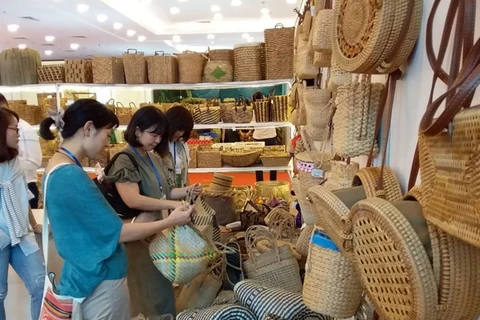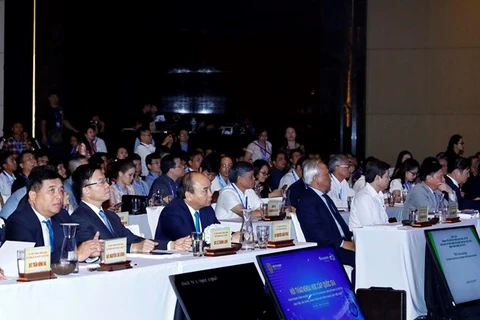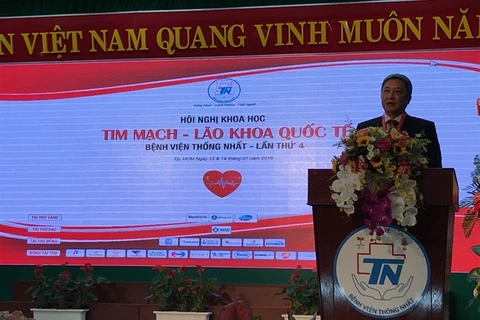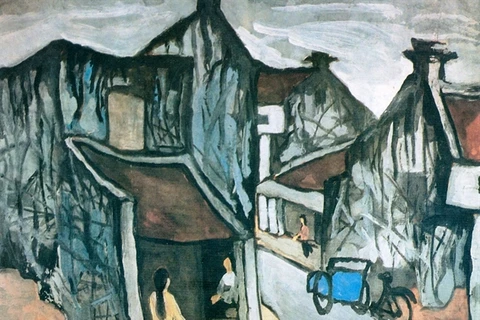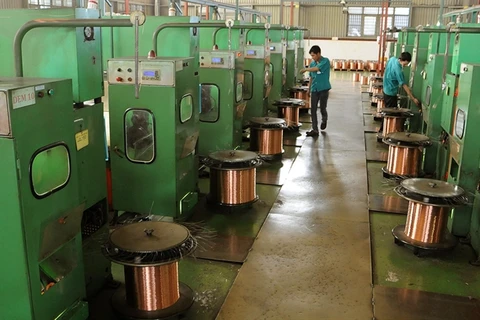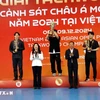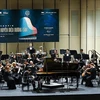Hanoi (VNS/VNA) - At first glance, fine arts and high tech may not be perfect bedfellows.
But according to experts who met in Hanoi on July 24, the Fourth Industrial Revolution can play a major role in developing arts and culture.
And through technology, a new wave of artists is exploding onto the scene with young graphic designers becoming modern day masters.
The workshop, which titled Effects of the Fourth Industrial Revolution to Fine Arts, Photography and Exhibition was hosted by the Ministry of Culture, Sports and Tourism.
Its aim is to review arts in Vietnam and help experts make necessary changes to use the revolution to develop individual creativeness.
“Fine arts, photography and exhibitions highlight personal creativeness,” said Ta Quang Dong, deputy minister of Culture, Sports and Tourism.
“The Fourth Industrial Revolution has affected widely to all facets of social life, science and technology as smart tools spread everywhere.
“A lot of types of software for designing graphics and processing images have been popularised,” he said.
“New technology has supported artists to form ideas and create art works while digital technology has helped share and connect cultural service on the internet.”
But despite this, he said there are many challenges the art world will face as the country moves into a new digital era.
Artists may become lazy and rely more on technology and be less creative; copyright should be cared more and fine arts staff should be re-trained properly.
Tu Manh Luong, head of the ministry’s Department of Science, Technology and Environment said technology has changed basic factors in culture and arts.
He said through new platforms, more people are getting access to art and it is enjoyed more by members of the public.
But emphasis must be placed on ensuring correct copyright procedures are followed to make sure work doesn’t get forged.
“We should take great care of protecting copyright and involving rights to art works because information technology and the internet have created chances for people to quickly get access and popularise art works,” he said.
Luong noted that the number of Vietnamese graphic artists is increasing, especially young artists, who can be classed as the fourth generation of Vietnamese fine arts.
“They are very energetic, creative and tend to search for new things and quickly catch up with the pace of renewal time,” he said.
Nguyen Lam Tuan Anh, from Vietnam National Culture and Arts Institute predicts that digital technology will more and more affect all stages of creative process including education and distribution.
“Digital technology will change also ways to train and educate people on traditional art,” he said.
“Art education using new technology, mostly applied in distance education will reduce the distance in approaching art involving training service,” he said
Anh said in most of official fine art training institutions in the country, the curriculum still involves much in professional skills and lacks of background knowledge on international culture.
“Teaching method has not really encouraged creativeness of learners,” he said.
Anh was afraid that the method will form a generation of fine art students, who will rely on computer software instead of their individual talents to create their own works.
Also, he expressed his concerns over the capabilities of those working in the field.
“Most of staff in fine arts, photography and exhibition field have not been equipped with knowledge on science, technology, especially high technology, technological advances,” he said.
“They have not been aware of the importance of and have the capability to apply new technology in creating effective art works, products and services, of which copyrights are legal and fully protected.”
He suggested the staff should be provided with updated knowledge on technology to work better in this modern time.
“The revolution has put fine arts in big challenge,” he implied. - VNS/VNA
But according to experts who met in Hanoi on July 24, the Fourth Industrial Revolution can play a major role in developing arts and culture.
And through technology, a new wave of artists is exploding onto the scene with young graphic designers becoming modern day masters.
The workshop, which titled Effects of the Fourth Industrial Revolution to Fine Arts, Photography and Exhibition was hosted by the Ministry of Culture, Sports and Tourism.
Its aim is to review arts in Vietnam and help experts make necessary changes to use the revolution to develop individual creativeness.
“Fine arts, photography and exhibitions highlight personal creativeness,” said Ta Quang Dong, deputy minister of Culture, Sports and Tourism.
“The Fourth Industrial Revolution has affected widely to all facets of social life, science and technology as smart tools spread everywhere.
“A lot of types of software for designing graphics and processing images have been popularised,” he said.
“New technology has supported artists to form ideas and create art works while digital technology has helped share and connect cultural service on the internet.”
But despite this, he said there are many challenges the art world will face as the country moves into a new digital era.
Artists may become lazy and rely more on technology and be less creative; copyright should be cared more and fine arts staff should be re-trained properly.
Tu Manh Luong, head of the ministry’s Department of Science, Technology and Environment said technology has changed basic factors in culture and arts.
He said through new platforms, more people are getting access to art and it is enjoyed more by members of the public.
But emphasis must be placed on ensuring correct copyright procedures are followed to make sure work doesn’t get forged.
“We should take great care of protecting copyright and involving rights to art works because information technology and the internet have created chances for people to quickly get access and popularise art works,” he said.
Luong noted that the number of Vietnamese graphic artists is increasing, especially young artists, who can be classed as the fourth generation of Vietnamese fine arts.
“They are very energetic, creative and tend to search for new things and quickly catch up with the pace of renewal time,” he said.
Nguyen Lam Tuan Anh, from Vietnam National Culture and Arts Institute predicts that digital technology will more and more affect all stages of creative process including education and distribution.
“Digital technology will change also ways to train and educate people on traditional art,” he said.
“Art education using new technology, mostly applied in distance education will reduce the distance in approaching art involving training service,” he said
Anh said in most of official fine art training institutions in the country, the curriculum still involves much in professional skills and lacks of background knowledge on international culture.
“Teaching method has not really encouraged creativeness of learners,” he said.
Anh was afraid that the method will form a generation of fine art students, who will rely on computer software instead of their individual talents to create their own works.
Also, he expressed his concerns over the capabilities of those working in the field.
“Most of staff in fine arts, photography and exhibition field have not been equipped with knowledge on science, technology, especially high technology, technological advances,” he said.
“They have not been aware of the importance of and have the capability to apply new technology in creating effective art works, products and services, of which copyrights are legal and fully protected.”
He suggested the staff should be provided with updated knowledge on technology to work better in this modern time.
“The revolution has put fine arts in big challenge,” he implied. - VNS/VNA
VNA

